Nelson Mandela
- 格式:doc
- 大小:50.50 KB
- 文档页数:2
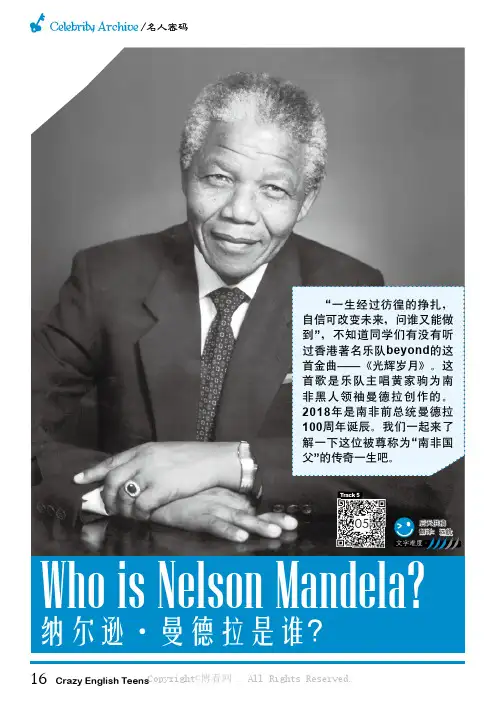
后天供稿翻译:远航文字难度·Who is Nelson Mandela?纳尔逊·曼德拉是谁?Track 51) endure [In5djuE ] v. 忍受2) dignity [5dI^nItI ] n. 尊严3) treat [tri:t ] v. 对待4) subject [5sQbdVIkt ] n. 经受者,对象5) racism [5reIsIzEm ] n. 种族主义6) vote [vEJt ] n. 投票权7) property [5pr ɒpEtI ] n. 财产8) capture [5kAptFE ] v. 抓捕9) imprison [Im5prIzn ] v. 监禁10) disharmony [5dIs5hB:mEnI ] n. 不和谐11) release [rI5li:s ] n. 释放12) violence [5vaIElEns ] n. 暴力13) charity [5tFArItI ] n. 慈善Nelson Mandela was born in July 1918. He is SouthAfrica’s first black President (1994~1999) and a braveman who 1)endured 27 years in prison with 2)dignity .Nelson’s parents couldn’t read or write, and he wasthe first in his family to attend school at age seven. Hisfather died when he was about nine, and he was sentto live with Jongintaba, the king of the Thembu, hispeople, and 3)treated as their son.Nelson went to University at Fort Hare and later theUniversity of Witwatersrand. He made many friends ofall colours and nationalities, but was the 4)subject of5)racism . Nelson became increasingly politically active,joining the African National Congress (the ANC) in1944 and helping to form the ANC Youth League. Atthe time in South Africa there were many things that theblacks were not allowed to do, including 6)vote and own7)property , and the ANC wanted to change that. Thispolicy was called “apartheid ” and the African NationalCongress was anti-apartheid.In 1962 Nelson was 8)captured and 9)imprisonedfor five years for encouraging the country to strike; thefollowing year he was charged with trying to overthrowthe government, and sentenced to life imprisonment.Nelson spent his many hard years in prisonstudying when he could and keeping in touch with theever-increasing 10)disharmony in South Africa, whichthreatened to break out into civil war. All over the worldpeople began to campaign for his 11)release . In 1990South Africa’s President de Klerk met Nelson andarranged for him to be released.After his release, Nelson and de Klerk workedtogether to end 12)violence in the country and restoreorder, and Nelson was elected President in 1994,serving for one term.After his presidency, Nelson Mandela focused on13)charity , setting up the Nelson Mandela Children’sFund and Nelson Mandela Foundation to fight povertyand HIV/AIDS. He won the Nobel Peace Prize (in 1993)and the US Presidential Medal of Freedom.纳尔逊·曼德拉出生于1918年7月。
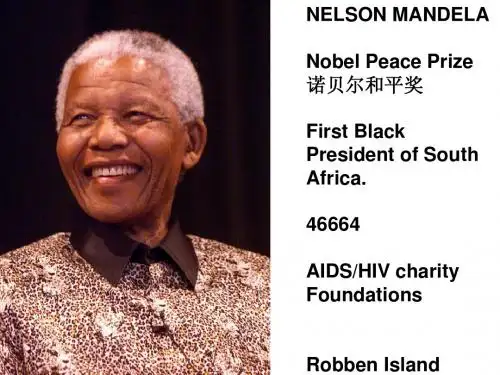
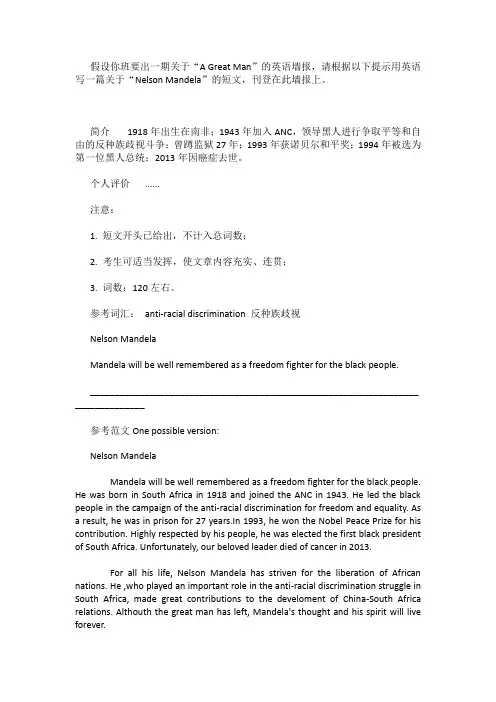
假设你班要出一期关于“A Great Man”的英语墙报,请根据以下提示用英语写一篇关于“Nelson Mandela”的短文,刊登在此墙报上。
简介1918年出生在南非;1943年加入ANC,领导黑人进行争取平等和自由的反种族歧视斗争;曾蹲监狱27年;1993年获诺贝尔和平奖;1994年被选为第一位黑人总统;2013年因癌症去世。
个人评价......注意:1. 短文开头已给出,不计入总词数;2. 考生可适当发挥,使文章内容充实、连贯;3. 词数:120左右。
参考词汇:anti-racial discrimination 反种族歧视Nelson MandelaMandela will be well remembered as a freedom fighter for the black people.__________________________________________________________________ ______________参考范文One possible version:Nelson MandelaMandela will be well remembered as a freedom fighter for the black people. He was born in South Africa in 1918 and joined the ANC in 1943. He led the black people in the campaign of the anti-racial discrimination for freedom and equality. As a result, he was in prison for 27 years.In 1993, he won the Nobel Peace Prize for his contribution. Highly respected by his people, he was elected the first black president of South Africa. Unfortunately, our beloved leader died of cancer in 2013.For all his life, Nelson Mandela has striven for the liberation of African nations. He ,who played an important role in the anti-racial discrimination struggle in South Africa, made great contributions to the develoment of China-South Africa relations. Althouth the great man has left, Mandela's thought and his spirit will live forever.He is the pride of the African people as well as the world.语言提炼:1.Highly respected by his people, ..........这一句中使用了过去分词respected 来做原因状语,同时用副词highly (高度地)来修饰过去分词2.He ,who played an important role in the anti-racial discrimination struggle in South Africa, made great contributions to the develoment of China-South Africa relations.这一句是非常值得学习的经典长难句,用who引导一个非限制性定语从句,同时使用了短语make great contributions to 对。
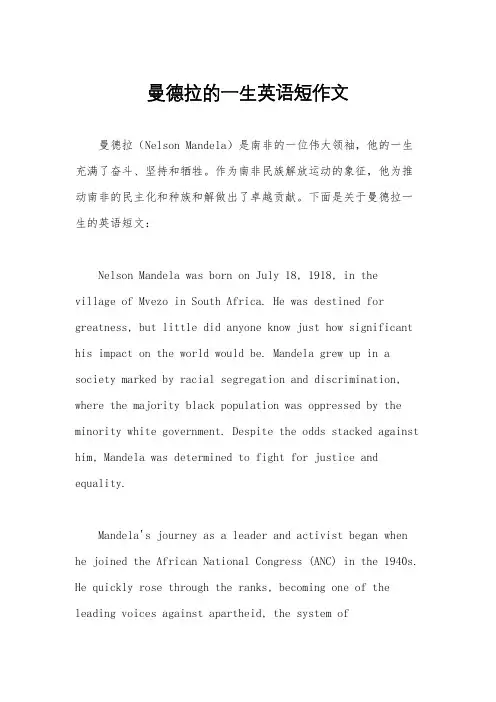
曼德拉的一生英语短作文曼德拉(Nelson Mandela)是南非的一位伟大领袖,他的一生充满了奋斗、坚持和牺牲。
作为南非民族解放运动的象征,他为推动南非的民主化和种族和解做出了卓越贡献。
下面是关于曼德拉一生的英语短文:Nelson Mandela was born on July 18, 1918, in thevillage of Mvezo in South Africa. He was destined for greatness, but little did anyone know just how significant his impact on the world would be. Mandela grew up in a society marked by racial segregation and discrimination, where the majority black population was oppressed by the minority white government. Despite the odds stacked against him, Mandela was determined to fight for justice and equality.Mandela's journey as a leader and activist began when he joined the African National Congress (ANC) in the 1940s. He quickly rose through the ranks, becoming one of the leading voices against apartheid, the system ofinstitutionalized racial segregation enforced by the South African government. Mandela's activism landed him in hot water with the authorities, and he was arrested multiple times for his political activities.In 1964, Mandela was sentenced to life in prison forhis involvement in anti-apartheid activities. He spent the next 27 years behind bars, enduring harsh conditions and separation from his family. Despite the hardships, Mandela remained steadfast in his commitment to the cause of freedom. His imprisonment only served to galvanize support for the anti-apartheid movement both within South Africaand around the world.Finally, in 1990, Mandela was released from prison, signaling the beginning of a new era for South Africa. He wasted no time in working towards reconciliation and democracy, leading negotiations with the government to dismantle apartheid and establish free and fair elections. Mandela's efforts culminated in the historic 1994 elections, in which he was elected as South Africa's first black president.As president, Mandela faced the daunting task of leading a deeply divided nation towards unity and reconciliation. He embraced the concept of forgiveness, famously declaring, "Courageous people do not fear forgiving, for the sake of peace." Mandela workedtirelessly to bridge the gap between black and white South Africans, promoting policies of inclusivity and equality.Mandela's presidency was marked by significant progress in areas such as healthcare, education, and social welfare. He also played a key role in promoting peace and stability across the African continent, earning him widespread admiration and respect both at home and abroad. Despite stepping down as president in 1999, Mandela continued to be a global advocate for human rights and social justice until his passing in 2013.In conclusion, Nelson Mandela's life serves as a testament to the power of perseverance, courage, and forgiveness. From his humble beginnings in rural South Africa to his historic presidency, Mandela remained true tohis principles and never wavered in his commitment to justice and equality. His legacy continues to inspire people around the world to strive for a better, more just society.。
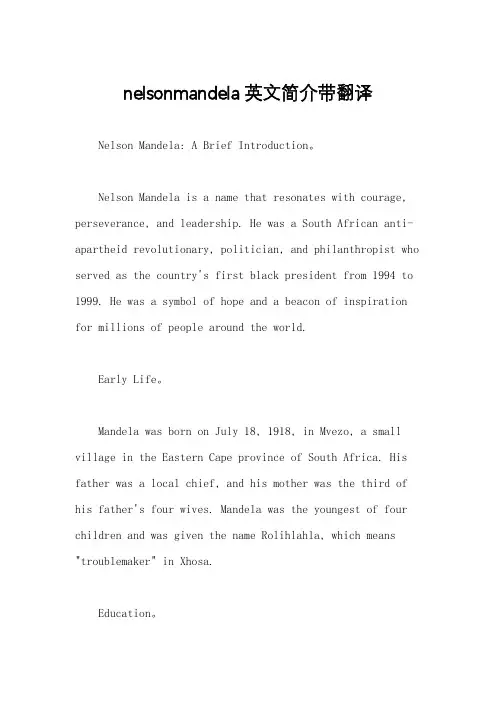
nelsonmandela英文简介带翻译Nelson Mandela: A Brief Introduction。
Nelson Mandela is a name that resonates with courage, perseverance, and leadership. He was a South African anti-apartheid revolutionary, politician, and philanthropist who served as the country's first black president from 1994 to 1999. He was a symbol of hope and a beacon of inspiration for millions of people around the world.Early Life。
Mandela was born on July 18, 1918, in Mvezo, a small village in the Eastern Cape province of South Africa. His father was a local chief, and his mother was the third of his father's four wives. Mandela was the youngest of four children and was given the name Rolihlahla, which means "troublemaker" in Xhosa.Education。
Mandela attended primary school in Qunu, where he was given the name Nelson by his teacher. He then went on to attend secondary school in Clarkebury and Healdtown, where he excelled academically and participated in various sports. In 1940, he enrolled at the University of Fort Hare, where he studied law and politics.Political Activism。

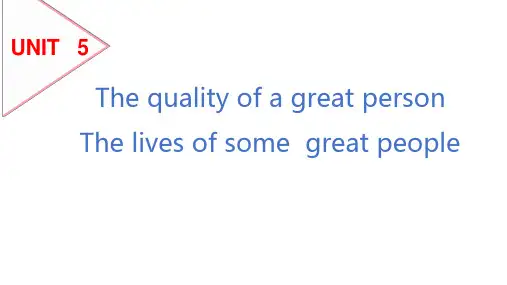

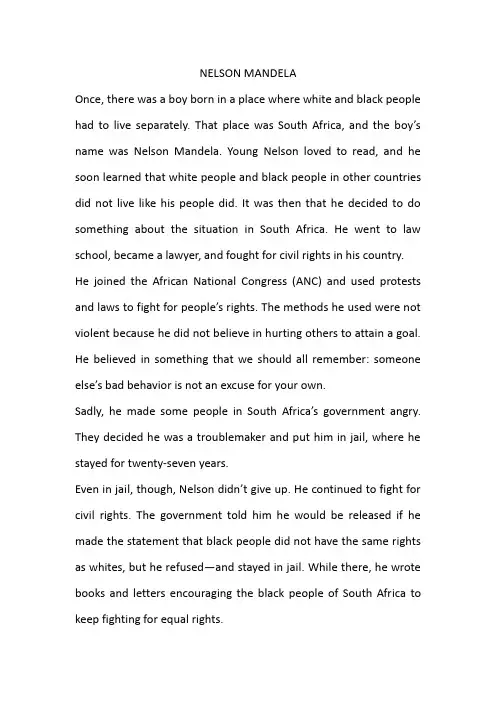
NELSON MANDELAOnce, there was a boy born in a place where white and black people had to live separately. That place was South Africa, and the boy’s name was Nelson Mandela. Young Nelson loved to read, and he soon learned that white people and black people in other countries did not live like his people did. It was then that he decided to do something about the situation in South Africa. He went to law school, became a lawyer, and fought for civil rights in his country. He joined the African National Congress (ANC) and used protests and laws to fight for people’s rights. The methods he used were not violent because he did not believe in hurting others to attain a goal. He believed in something that we should all remember: someone else’s bad behavior is not an excuse for your own.Sadly, he made some people in South Africa’s government angry. They decided he was a troublemaker and put him in jail, where he stayed for twenty-seven years.Even in jail, though, Nelson didn’t give up. He continued to fight for civil rights. The government told him he would be released if he made the statement that black people did not have the same rights as whites, but he refused—and stayed in jail. While there, he wrote books and letters encouraging the black people of South Africa to keep fighting for equal rights.When he got out of jail, Nelson was so popular and loved that he was elected president of South Africa. He went on to inspire people and change the laws he’d fought against when he was younger.How can you inspire others? You can inspire people in so many ways. Your actions should inspire others to dream more, learn more, do more, and become more. Being your best self inspires others to do the same.Did you know that Nelson’s last name on his birth certificate was Roli hlahla? In his Xhosa tribe’s language, this name means “pulling the branch of a tree” or “troublemaker.”。
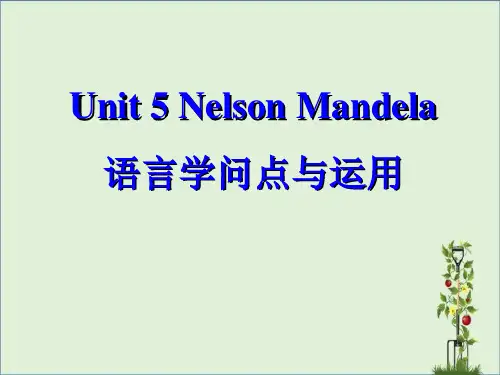
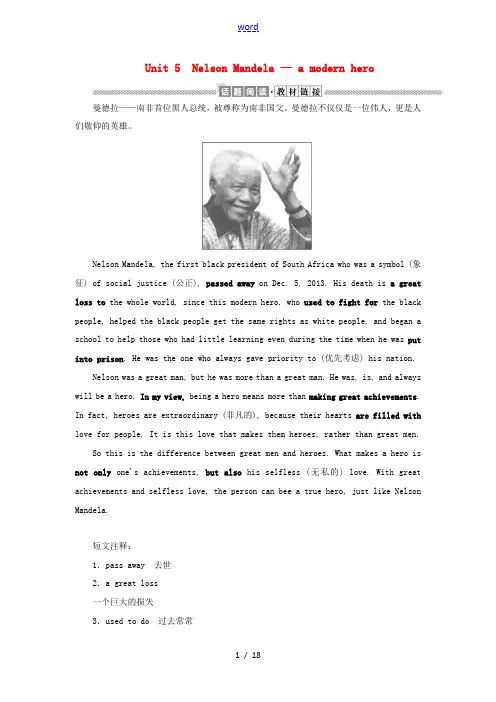
Unit 5 Nelson Mandela — a modern hero曼德拉——南非首位黑人总统,被尊称为南非国父。
曼德拉不仅仅是一位伟人,更是人们敬仰的英雄。
Nelson Mandela, the first black president of South Africa who was a symbol (象征) of social justice (公正), passed away on Dec. 5, 2013. His death is a great loss to the whole world, since this modern hero, who used to fight for the black people, helped the black people get the same rights as white people, and began a school to help those who had little learning even during the time when he was put into prison. He was the one who always gave priority to (优先考虑) his nation.Nelson was a great man, but he was more than a great man. He was, is, and always will be a hero. In my view, being a hero means more than making great achievements. In fact, heroes are extraordinary (非凡的), because their hearts are filled with love for people. It is this love that makes them heroes, rather than great men.So this is the difference between great men and heroes. What makes a hero is not only one's achievements, but also his selfless (无私的) love. With great achievements and selfless love, the person can bee a true hero, just like Nelson Mandela.短文注释:1.pass away 去世2.a great loss一个巨大的损失3.used to do 过去常常4.fight for... 为……而奋斗5.put... into prison将……投入监狱6.in my view 在我看来7.make great achievements取得巨大成就8.be filled with 充满9.not only... but also...不但……而且……Section ⅠWarming Up & Reading —Prereading重点单词写作词汇1.quality n.质量;品质;性质2.mean adj. 吝啬的;自私的;卑鄙的3.generous adj. 慷慨的;大方的4.found vt. 建立;建设5.principle n. 法则;原则6.stage n. 舞台;阶段;时期7.vote vt.&vi. 投票;选举n. 投票;选票;表决8.attack vt. 进攻;攻击;抨击拓展词汇1.active adj.积极的;活跃的→actively adv.积极地→activity n.活动2.devote vt.(与to连用)献身;专心于→devoted adj.忠实的;深爱的→devotion n.热爱;献身;奉献3.peaceful adj.和平的;平静的;安宁的→peacefully adv.和平地→peacen.和平;平静;和睦①peace→peaceful和平的②pain→painful 痛苦的③harm→harmful 有害的④power→powerful 强大的⑤meaning→meaningful 有意义的⑥cheer→cheerful 欢乐的后缀ance高频名词全接触①guidance 指导;领导②importance 重要;重要性③ignorance 无知;愚昧④signifi cance 意义;重要性⑤appearance 出现⑥tolerance 宽容;容忍self反身代词①myself 我自己②yourself 你自己③himself 他自己④herself 她自己⑤itself 它自己⑥ourselves 我们自己⑦yourselves 你们自己⑧themselves 他们自己“out of+n.”短语集锦①out of work失业②out of control 失控③out of mind 心不在焉④out of order 有毛病;出故障⑤out of sight 看不见“in+n.”短语面面观①in trouble 在困境中②in danger 处于危险中③in return 作为回报④in vain 徒劳地⑤in order 井然有序⑥in place 在适当的位置Step One:Warming upA famous person may not be a great person, but a great person must be a famous person.1.Who do you think are great persons in the following pictures?答案:A,B and E2.What do you know about Nelson Mandela?He_devotes_his_life_to_helping_his_people_get_the_same_rights_as_white_peop le_in_his_country./He_is_a_national_leader_who_has_been_fighting_for_making_bla ck_and_white_people_equal./Nelson_Mandela_is_regarded_as_one_of_the_greatest_sp iritual_and_political_leaders_of_our_time.Step Two:Fast readingSkim the text and choose the best answers.1.What's the main idea of the text?A.The life of black workers.B.The fight between Mandela and the white people.C.The stories between Mandela and Elias.D.The education of Elias.答案:C2.Match the main idea of each part.Paras.1~2(B) A.The change of Elias' life after he met Nelson Mandela and what Mandela didParas.3~7(A) B.The life of Elias before he met Nelson MandelaStep Three:Careful readingRead the reading passage carefully and choose the best answers according to the text.1.Why did Elias have to leave school?A.He didn't have a passbook.B.His home was far from the school.C.His family couldn't afford the school fees.D.He couldn't read or write.答案:C2.Nelson Mandela opened a black law firm in order to ________.A.make moneyB.help the poor black people with their problemsC.make himself famousD.study law答案:B3.How did Nelson Mandela help Elias keep his job?A.He talked with Elias' boss.B.He helped him get the correct papers.C.He lent him some money.D.He asked him to go to court.答案:B4.What dream did Nelson Mandela have?A.To bee the president of South Africa.B.To win the Nobel Peace Prize.C.To make black and white people equal.D.To blow up some government buildings.答案:CStep Four:Explain difficult sentences1.The time when I first met Nelson Mandela was a very difficult period of my life.[句式分析][尝试翻译]第一次见到纳尔逊·曼德拉的时候,是我一生中非常艰难的时期。
高一英语必修一Unit 5课文翻译Unit 5 Nelson Mandela - a modern heroReadingAELIAS’ STORY伊莱亚斯的故事My name is Elias. I am a poor black worker in South Africa.我的名字叫伊莱亚斯。
我是南非的一个穷苦的黑人工人。
The time when I first met Nelson Mandela was a very difficult period of my life.第一次见到纳尔逊·曼德拉的时候,是我一生中非常艰难的时期。
I was twelve years old. It was in 1952 and Mandela was the black lawyer to whom I went for advice.(当时)我才12岁,那是在1952年,曼德拉是我寻求帮助的一位黑人律师。
He offered guidance to poor black people on their legal problems.他为那些穷苦黑人提供法律指导。
He was generous with his time, for which I was grateful.他十分慷慨地给予我时间,我为此非常感激。
I needed his help because I had very little education.由于我所受的教育很少,所以我需要他的帮助。
I began school at six. The school where I studied for only two years was three kilometers away.我六岁开始上学,我仅仅在那里读了两年的学校有三公里远。
I had to leave because my family could not continue to pay the school fees and the bus fare.我不得不辍学,因为我的家庭无法继续支付学费和交通费。
克服困难实现梦想的人物有很多杰出的人物在面对重重困难时成功实现了自己的梦想。
以下是一些克服困难实现梦想的杰出人物:1. **贝利·纳尔逊·曼德拉(Nelson Mandela):**- 曼德拉是南非的反种族隔离活动家,被关押27年之久。
尽管遭受巨大的压力和不公,但他坚持自己的信仰,最终在1994年成为南非第一位黑人总统,成功推动国家走向和解与平等。
2. **海伦·凯勒(Helen Keller):**- 凯勒在幼年时因疾病失去了视力和听力,但她通过勇气和毅力克服了身体上的困难,最终成为一位作家和社会活动家。
她的故事鼓舞了许多人,展示了战胜不可思议困难的力量。
3. **史蒂芬·霍金(Stephen Hawking):**- 世界著名的理论物理学家,霍金在年轻时被诊断患有肌萎缩侧索硬化症(ALS),导致他几乎完全丧失了运动能力。
然而,他通过坚韧不拔的努力,继续进行卓越的科学研究,成为现代科学的巨星。
4. **奥普拉·温弗瑞(Oprah Winfrey):**- 从贫困家庭出发,奥普拉在早年面临了极大的困境,包括贫困、性侵和种族歧视。
然而,她通过勤奋工作和坚持不懈的努力,成为美国最成功的女性媒体企业家之一,同时也是慈善家和激励者。
5. **尤金·奥尼尔(Eugene O'Neill):**- 美国戏剧家奥尼尔在个人生活中面临家庭问题、心理健康挑战以及酗酒问题。
然而,他的作品却为他赢得了多个普利策奖和诺贝尔文学奖,被誉为美国戏剧之父。
这些人物的故事告诉我们,即使面对巨大的困难,坚持信念、努力拼搏和对梦想的执着,都能够帮助人们克服各种困境,最终实现自己的梦想。
我最敬佩的伟人英语作文80词One of the greatest leaders I admire is Nelson Mandela. He was a symbol of justice, equality, and reconciliation in the world.我最敬佩的伟人之一是纳尔逊·曼德拉。
他是世界上正义、平等和和解的象征。
Nelson Mandela's lifelong struggle against apartheid in South Africa and his unwavering commitment to peace and justice have left a profound impact on me. His courage, resilience, and ability to forgive truly inspire me to be a better person every day.纳尔逊·曼德拉终身与南非种族隔离制度作斗争,对和平与正义的坚定承诺给我留下了深刻的影响。
他的勇气、坚韧和宽恕能力真正激励我每天都要成为一个更好的人。
As a leader, Nelson Mandela demonstrated exceptional qualities of leadership, including humility, integrity, and humility. His ability to bring people together and transcend differences was truly remarkable.作为一名领袖,纳尔逊·曼德拉展现了卓越的领导品质,包括谦虚、正直和宽容。
他能够团结人民,超越分歧的能力真正令人钦佩。
Moreover, Nelson Mandela's willingness to sacrifice his own freedom for the greater good of the people is a testament to his selflessness and dedication to the cause of freedom and equality.此外,纳尔逊·曼德拉为了人民的利益而牺牲个人自由的意愿证明了他的无私和对自由与平等事业的奉献。
nelson mandela英文作文Nelson Mandela was a remarkable leader and a symbol of hope for many people around the world. His story is one of resilience, courage, and determination. Mandela's fight against apartheid in South Africa inspired millions and continues to be an inspiration today.Mandela's journey began in a small village in the Eastern Cape of South Africa. He grew up in a society that was deeply divided along racial lines, with the majority of the population subjected to discrimination and oppression. Despite this, Mandela never lost hope and believed in the power of education to bring about change.As a young man, Mandela became involved in the African National Congress (ANC), a political party that fought for the rights of black South Africans. He was a passionate advocate for equality and justice, and his speeches were filled with fiery rhetoric and a call to action. Mandela's words resonated with people from all walks of life, as hespoke directly to their struggles and aspirations.In 1962, Mandela was arrested and sentenced to life imprisonment for his anti-apartheid activities. He spent 27 years behind bars, but his spirit remained unbroken. Mandela used his time in prison to educate himself and to continue his fight for freedom. He became a symbol of resistance, and his name became synonymous with the struggle against apartheid.Finally, in 1990, Mandela was released from prison, and the world watched as he walked out a free man. His release marked a turning point in South African history and paved the way for negotiations to end apartheid. Mandela's leadership and ability to bring people together were instrumental in the peaceful transition to democracy in South Africa.In 1994, Mandela was elected as the first black president of South Africa. His presidency was marked by a commitment to reconciliation and healing. Mandela understood that in order for the country to move forward,it needed to confront its painful past and work towards forgiveness and unity. He established the Truth and Reconciliation Commission, which allowed victims of apartheid to share their stories and seek justice.Mandela's legacy extends far beyond his time as president. He was a global advocate for human rights, and his work continues to inspire activists around the world. Mandela's message of peace, forgiveness, and equality resonates with people from all walks of life, and his impact will be felt for generations to come.In conclusion, Nelson Mandela's life and legacy are a testament to the power of resilience, courage, and determination. His fight against apartheid and his commitment to justice continue to inspire people around the world. Mandela's story reminds us that change is possible, even in the face of seemingly insurmountable obstacles. He will forever be remembered as a true hero and a symbol of hope.。
高中英语必修-Unit5Nelson Mandela——a modern hero要点解析一、词汇过关1. devote【考纲释义】vt. 投入;献身The old lady devoted himself entirely to education career. 那位老人将一生奉献给了教育事业。
Sue devoted most of her time and energy to caring for the kids. 苏将绝大多数时间和精力都献身于照料孩子们。
【知识拓展】devote (one’s life / time / energy / money / oneself) to (doing) sth...献身于;专心于注意:该短语中to是介词,后面接名词或动词-ing。
常见的类似短语还有:lead to(导致……); look forward to(盼望……);pay attention to (注意……); prefer…to(相比……更喜欢……); stick to (坚持……)。
be devoted to sth. / sb. / doing sth.致力于、贡献于。
devotion n.献身、贡献2. reward【考纲释义】vt & n. 酬谢,给予报答;报酬,奖金My father promised to reward me with a big chocolate.父亲承诺奖励我一块大巧克力。
He worked hard without much reward. 他工作很努力,但是报酬很少。
【知识拓展】in reward (for...)作为(对……的)报酬、报答;give a reward to sb. for sth. 为……给某人报酬、赏金; reward sb. for (doing) sth. 因……报答、奖赏某人; reward sb. with sth.用……报答、奖赏某人词义辨析:reward指回报,报酬award指获奖,奖励prize指奖励,奖金3. equal【考纲释义】adj. 平等的;相等的v. 等于,和……相媲美n. 相当;平手Women demand equal pay for equal work.女性要求同工同酬。
纳尔逊·曼德拉语录"Education is the most powerful weapon which you can use to change the world." - Nelson Mandela"教育是你可以用来改变世界的最强大的武器。
" - 纳尔逊·曼德拉"It always seems impossible until it's done." - Nelson Mandela"直到完成之前,一切都看似不可能。
" - 纳尔逊·曼德拉"I am fundamentally an optimist. Whether that comes from nature or nurture, I cannot say. Part of being optimistic is keeping one's head pointed toward the sun, one's feet moving forward. There were many dark moments when my faith in humanity was sorely tested, but I would not and could not give myself up to despair. That way lays defeat and death." - Nelson Mandela"我基本上是一个乐观主义者。
无论这是源于天性还是培养,我无法说。
乐观的一部分是把头朝向太阳,脚步向前迈进。
在我对人性的信念受到严峻考验的许多黑暗时刻,但我不会也不能陷入绝望。
那样只会导致失败和死亡。
" - 纳尔逊·曼德拉"I learned that courage was not the absence of fear, but the triumph over it. The brave man is not he who does not feel afraid, but he who conquers that fear." - Nelson Mandela"我学到,勇气并不是不害怕,而是战胜它。
BiographyNelson Rolihlahla Mandela was born in Transkei, South Africa on July18, 1918. His father was Chief Henry Mandela of the Tembu Tribe.Mandela himself was educated at University College of Fort Hare and theUniversity of Witwatersrand and qualified in law in 1942. He joined theAfrican National Congress in 1944 and was engaged in resistance againstthe ruling National Party's apartheid policies after 1948. He went on trialfor treason in 1956-1961 and was acquitted in 1961.After the banning of the ANC in 1960, Nelson Mandela argued for thesetting up of a military wing within the ANC. In June 1961, the ANCexecutive considered his proposal on the use of violent tactics and agreed that those members who wished to involve themselves in Mandela's campaign would not be stopped from doing so by the ANC. This led to the formation of Umkhonto we Sizwe. Mandela was arrested in 1962 and sentenced to five years' imprisonment with hard labour. In 1963, when many fellow leaders of the ANC and the Umkhonto we Sizwe were arrested, Mandela was brought to stand trial with them for plotting to overthrow the government by violence. His statement from the dock received considerable international publicity. On June 12, 1964, eight of the accused, including Mandela, were sentenced to life imprisonment. From 1964 to 1982, he was incarcerated at Robben Island Prison, off Cape Town; thereafter, he was at Pollsmoor Prison, nearby on the mainland.During his years in prison, Nelson Mandela's reputation grew steadily. He was widely accepted as the most significant black leader in South Africa and became a potent symbol of resistance as the anti-apartheid movement gathered strength. He consistently refused to compromise his political position to obtain his freedom.Nelson Mandela was released on February 11, 1990. After his release, he plunged himself wholeheartedly into his life's work, striving to attain the goals he and others had set out almost four decades earlier. In 1991, at the first national conference of the ANC held inside South Africa after the organization had been banned in 1960, Mandela was elected President of the ANC while his lifelong friend and colleague, Oliver Tambo, became the organisation's National Chairperson. Selected BibliographyMandela, Nelson. Nelson Mandela Speaks: Forging a Democratic, Nonracial South Africa. New York: Pathfinder, 1993.Mandela, Nelson. Long Walk to Freedom. The Autobiography of Nelson Mandela. Boston & New York: Little Brown, 1994.QuotesIn my country we go to prison first and then become President.If there are dreams about a beautiful South Africa, there are also roads that lead to their goal. Two of these roads could be named Goodness and Forgiveness.I dream of an Africa which is in peace with itself.I dream of the realization of the unity of Africa, whereby its leaders combine in their efforts to solve the problems of this continent. I dream of our vast deserts, of our forests, of all our great wildernesses.I detest racialism, because I regard it as a barbaric thing, whether it comes from a black man or a white man.If the United States of America or Britain is having elections, they don't ask for observers from Africa or from Asia. But when we have elections, they want observers.Communists have always played an active role in the fight by colonial countries for their freedom, because the short-term objects of Communism would always correspond with the long-term objects of freedom movements.Let freedom reign. The sun never set on so glorious a human achievement.Let there be work, bread, water and salt for all.Does anybody really think that they didn't get what they had because they didn't have the talent or the strength or the endurance or the commitment?For to be free is not merely to cast off one's chains, but to live in a way that respects and enhances the freedom of others.I learned that courage was not the absence of fear, but the triumph over it. The brave man is not he who does not feel afraid, but he who conquers that fear.If you talk to a man in a language he understands, that goes to his head. If you talk to him in his language, that goes to his heart.If you want to make peace with your enemy, you have to work with your enemy. Then he becomes your partner.It always seems impossible until it’s done.It is better to lead from behind and to put others in front, especially when you celebrate victory when nice things occur. You take the front line when there is danger. Then people will appreciate your leadership.。